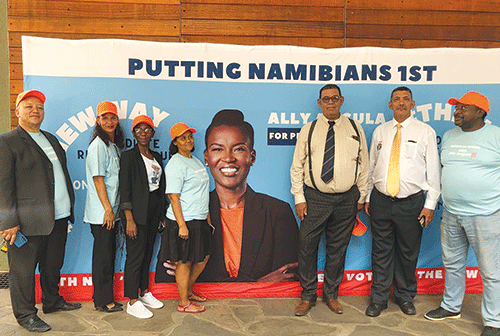Presidential hopeful Ally Angula on Tuesday launched a manifesto that she believes will reshape the socio-economic landscape of the country.
Dubbed ‘The New Way’, her manifesto outlines a bold plan.
Once elected into the highest office in the land, the independent candidate says every Namibian aged 18 to 59 will receive a monthly allowance of N$1 750. She also promised the same amount for orphans under 18, as well as for widows and
widowers. A proposal for a Basic Income Grant in Namibia was made in 2002 by the Namibian Tax Consortium (NAMTAX), a government-appointed commission. The consortium made the proposal for a basic income grant (BIG) in light of the high poverty levels, and the unequal distribution of income in Namibia. A pilot basic income grant project was conducted in the Otjivero-Omitara area, about 100 kilometres east of Windhoek, from 2007 to 2009 with positive results in reducing poverty and crime and in raising levels of school attendance. Last year, the government transitioned the food bank programme to a conditional basic income grant. A cash transfer of N$600 per household is made monthly for the existing 8 339 food bank beneficiaries.
The gender equality and poverty eradication ministry spends over N$500 million per month on social grants. Angula has also vowed to create
100 000 immediate jobs after the elections, and 500 000 jobs in the next three years.
Speaking during the launch, she highlighted her focus on destitute Namibians.
“We are facing an economic crisis that needs an economically literate person to solve it,” she said, boasting of her credentials and her humanitarian prowess to address this issue.
The independent candidate is a former finance ministry deputy executive director and businesswoman.
Over the years, Angula noted, she has helped parents register their children for school, and assisted families struggling with finances and other needs. “Every day, people come to our campaign office asking, ‘Mee Ally, give us this, give us that.’ This shows that Namibians are really struggling day in and day out without jobs, struggling to sell their things so they can feed their children,” she said.
She described her manifesto not just as a promise, but as a bold vision for the future, aimed squarely at addressing the everyday challenges faced by Namibians.
Her strategy, ‘The New Way’, is divided into three plans: to create immediate relief for families, provide money for local businesses, and create immediate jobs. She also has an ambitious goal of ensuring that every Namibian household, whether in town or village, has opportunities for monthly cash income. She believes this can be achieved by implementing targeted interventions focusing on fostering a culture of self-reliance and innovation, while urgently addressing skills gaps. According to her, the job-creation plan will be implemented through funding that will create new jobs immediately through government investment in infrastructure and meeting basic service needs. She also plans to use vocational training to bridge the skills gap by funding their businesses. “I know that for too many Namibians, the dream of a prosperous future feels out of reach. ‘The New Way’ is our bold answer to years of struggle. By realigning the role of government, we can unlock a new era of economic reform, creating jobs, fostering businesses and building a brighter future for all Namibians,” she said.
As if that is not enough, the presidential hopeful plans to invest N$12 billion in the “Enterprise Namibia Fund”, create a VTC build programme, invest N$5 billion in the VTC graduate renovate, repair and restore programme, and create a VTC mobile clinic and government vehicle fleet rebuild programme. All these, she said, are aimed at creating an economically sustainable future.
‘Yes, she can’
Economic analyst Gabriel Erastus is of the opinion that Angula’s plan is feasible.
He said the possibility of it happening depends on the type of plan and the economic multiplier effect, which depends on the type of sector in which she is going to invest the money. “There are sectors that have a higher multiplier effect, meaning that if you throw a dollar in, it will exchange hands with a lot of people. For example, in the construction sector, once you come up with a project, it employs people such as lawyers, surveyors
and labourers, meaning that everyone benefits from one construction building,” he said.
Looking at Angula’s strategies, Erastus is in full support of them, saying it is important to create a fund that funds entrepreneurs.
“The issue we have is with startup financing. We have a problem where entrepreneurs are not being funded to start businesses. We do not have incubation centres. We have low
tolerance for funding small businesses or concepts, so if her idea is to create a fund that will inject capital into start-ups, then her plan is viable because there is a huge gap,” he
noted. Erastus said concepts and ideas are not funded in Namibia, as they are deemed risky, which he believes needs to change.’
He is also in support of her idea to invest in vocational graduates. “You cannot industrialise without vocational centres. If you look at the case of Germany, they are where they are because they invest in vocational schools, meaning they are able to create things, assemble cars, and so forth. If you look at the government garage, you probably have 50% of their vehicles not working, but if you can create a synergy and use vocational graduates to fix such, the government will reduce their expenditure,” he added. Another economist, Klaus Schade, branded Angula’s plan ambitious. While Schade also supports Erastus’ idea of investing in startups, he places special emphasis on establishing concrete plans to pull them off the ground.
“The whole business environment needs to be considered, and economic sectors need to be identified to create this number of jobs,” said Schade. He said one of the sectors with certain potential is the agriculture sector. However, he believes the projects that are currently on the agenda cannot create the targeted jobs.



